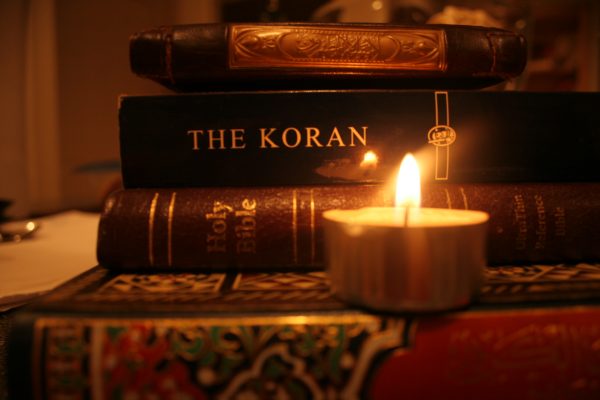Deferred Dreams, Self-Destruction, and Suicide Bombings

By Shaykh Hamza Yusuf
There was a story in the New York Times a few days ago about how the “revolution” in Tunisia was sparked in December by the self-immolation of Mohamed Bouazizi, a 26-year-old, befuddled roadside green grocer. Like so many young Arabs, he was born poor and only dreamed of providing for his siblings and his mother. He had been to college, where he studied law, but had found no employment possibilities. So, given the basic dignity often found in people in places like Tunisia, he chose to humble himself and find a halal means to generate some income. But he kept running into problems with the police and government inspectors until the fateful day in December when they confiscated his cart and his produce, saying he didn’t have a proper permit, and leaving him with an unpaid loan with which he’d bought the goods. At the station, upon attempting to reclaim his cart, he was slapped and humiliated publicly. His already deferred dreams had clearly dried up. Bouazizi left an apologetic note for his mother and set himself on fire in front of the local government building.
Four weeks later, the protests sparked by his death brought down the government of President Zine el Abdidine Ben Ali, who’d ruled Tunis with an iron hand for 23 years.
I have had the good fortune of visiting Tunisia many times. During my last visit, which was in the early nineties, I was harassed by the Mukhabarat (secret police), and the family that I was staying with was also questioned. That left a bad taste for me, and I decided not to return to the country and have not been back since.
Mukhabarat notwithstanding, my experience of the Tunisians is that they are wonderful people. They are known among Arabs for being kind and gentle. They are slow to lose their temper and quick to lend a hand to a stranger. I remember seeing young men selling beautiful bundles of jasmine flowers that had such a powerful scent that you could smell a seller coming your way long before he reached you.
Tunisia is a stunningly beautiful country with a great history and a bright and talented people, but corruption, cruelty, and the ineptitude of leaders unable to gauge the frustration of their people has led to the current crisis. Like so many Muslim countries, its government has been run largely by a family operation with a tribal mentality that was milking a population dry.
When the government was brought down this month, President Ben Ali fled with his wife, Leila, to Jeddah of all places; terrible floods in the port city inauspiciously welcomed him. It seems that Jeddah is the choice retirement haven of ex-African Muslim tyrants, including the former dictator Idi Amin of Uganda. Sometimes, birds of prey flock together in unlikely places. No doubt, Ben Ali has millions, if not billions, of dollars in his Swiss accounts, but even Europe, despite its dire need of cash, didn’t want him. Options diminish quickly for these men once they’re out of political power, but where odiousness closes doors in some places, great wealth obviously opens them in others.
The irony is that such tyrants usually rise to power because the people want to get rid of tyranny from a previous source. Years ago, I was in the house of the great Tunisian scholar, Shaykh Shadhili Nayfar, who was from a proud Andalusian family that had fled to Tunis with the collapse of Muslim Spain. Shaykh Shadhili had been the dean at al-Zaytuna University, one of the oldest and most prestigious universities in the world. He studied rare manuscripts and had a great library in his home that researchers could use. Since he was a former Member of Parliament in Tunisia, I asked him about the country’s history. He told me that during the anti-colonial movement to rid the country of the French, the scholars of al-Zaytuna University were very powerful indeed, but the single most unifying force was around the politician, Habib Bourguiba, and the scholars of al-Zaytuna debated long and hard whether or not to back Bourguiba, as he was an avowed secularist and had no commitment to the religion.
Shaykh Shadhili said that the scholars opted to support Bourguiba because they thought he would help the Tunisians oust the French, and they could deal with him thereafter. However, little did these scholars realize that Bourguiba would be worse than the French and would, in fact, turn against them before they could do anything about him. This seems to be the great lesson of revolutions and coups: With rare exceptions, they bring in new governments that are as bad or worse than the ones they ousted. The man who just fled from Tunisia to Jeddah had taken the government from a decrepit and delirious Bourguiba promising the Tunisians that the age of tyranny was over. Hah.
An intriguing aspect of the current Tunisian situation is the absence of ideology. This is a genuine uprising of people who are sick and tired of the corruption and cruelty of a state apparatus. Monarchs of old practiced the tradition of benevolence. They were not always benevolent but were raised with the understanding that they were there to serve the people. These pathetic Arab rulers who overthrew those monarchs practice the worst types of cronyism and nepotism, placing their sons on their “thrones,” and they thrive in an environment that is driven by family and tribal allegiance. The cracks have been showing for a while. And now, in Tunisia, it has all come tumbling down.
The lessons of history are worth heeding. Tunis, once called Carthage, had a mythical queen, Dido. According to legend, she killed herself on a funeral pyre due to her despair at being scorned by Aeneas, who abandoned her to Rome. The historical Hannibal led a Tunisian army to Rome to rid Tunis of Roman persecution, but he failed, and Rome’s vengeance led to the salting of the soil in Tunis and the destruction of Carthage that lies in ruins today near the capital. The Muslim world now has its share of misguided, petty Hannibals who think that by attacking Rome, they will restore the glory of “Carthage.” Yet, their attacks only provide the necessary excuses for the Empire to salt the soil of Iraq and Afghanistan.
***** ***** *****
While the Tunisian Dido didn’t accomplish anything through her suicide by fire, our poor green grocer, Mohamed Bouazizi, has ignited the Arab world in flames, achieving in death what he could not in life – sense of purpose and meaning – indubitably more than all the suicide bombers around the globe combined. His was an act of a desperate man who chose not to kill others but instead to light himself on fire in protest. This was the sacrificial tactic that Buddhist monks used during the Vietnam War, and their actions had a massive impact on the psyches of Westerners. When a situation becomes so desperate that people choose to leave the world rather than to stay in it and struggle, the message to the surviving ones is clear: it is time for a change. Well that change is happening in Egypt and other places in the Muslim world. Let’s hope for the best and pray for these poor, suffering people who deserve far better than their leaders have given them.
Suicide is rare in the Muslim world, but it’s increasing. God makes life generally bearable for people, so they will choose even highly difficult situations over the option of checking out. Hamlet’s famous soliloquy, which begins with “To be or not to be,” reminds us that in taking our own lives, we may be fleeing to troubles far greater than the ones prompting us to flee.
An odd aspect of the reaction to Bouazizi’s suicidal act is that some Muslims will surely condemn it, since suicide is clearly prohibited in Islam, but these same Muslims will justify the actions of suicide bombers, now euphemistically called “martyrdom operations” (‘amiliyyat istishhadiyyah) on Arabic newscasts. The justifiers point out that suicide bombing is an act of defense, and their only real weapon at that.
But the similarities and differences of a suicide and suicide bombing are worth contemplating. In Bouazizi’s mind, suicide was his only weapon of defense against an unjust Tunisian government that would neither listen to him nor even let him earn a livelihood selling vegetables without having to bribe some low-level official to get the piece of paper that would enable him to do so. A suicide bomber, as the social science studies show, is also in a similar state of despair, and straps bombs to himself so he can kill himself and other people about whom he knows nothing. The assumption the suicide bomber makes seems to be, “My life and my people’s lives are miserable, and no one is doing anything about it, so it might fix things if I sacrifice my life and take a bunch of other people’s lives too.” Hence, some people just being on an Israeli street corner become a target, irrespective of whether they support or oppose Israeli aggression against Palestinians. What makes such suicide bombing more honorable than Bouazizi’s suicide?
Suicide is suicide, it seems to me, but it becomes truly heinous when one decides to take others with him using indiscriminate methods of mass destruction. I cannot sit in judgment of the Palestinians who have resorted to such measures nor the Chechnyian women who lost husbands and children and in acts of savage revenge killed themselves and others. I am not in their shoes, and I cannot fathom the depth of their despair. However, I do not condone the act of suicide bombing or any form of suicide, as I consider both to be of the same ilk, and in fact the former is worse in my estimation due to the extended harm to others. And I do judge the notion that suicide bombers are somehow not really committing suicide (because they are taking the lives of others) yet our Tunisian green grocer deserves to go to hell because he is committing suicide. He is not seen as a martyr, but the suicide bombers are viewed as noble martyrs because along with their own lives they took some possibly innocent bystanders; hence, in this view, suicide bombers deserve a martyr’s honor and paradise. I must admit, I just don’t get it; I think those who promote this notion need to study Mizan al-amal and the other great texts of ethical theory in our tradition.
Like copycat suicide bombers who now proliferate all over the Muslim world, we are seeing copycat self-immolators in places like Egypt, Algeria, and even Mauritania. Dr. T. J. Winter said, “Suicide bombing is an extreme way of shooting oneself in the foot.” The Muslim world deserves better strategies for dealing with very real social issues as well as better leadership, clearly.
***** ***** *****
Though suicide is haram, the simple protest of this Tunisian street vendor did more to change the status quo and put real fear in the hearts of the tyrants than all of the suicide bombers. We must devise better and more civilized ways of dealing with our differences, as we live in an age of nuclear power, machine guns, aerial bombings, and global news cycles that expose us to the pain and suffering of peoples in far off places.
Many people in the West have no idea how much the Arab on the street suffers from humiliation under unjust rulers and their petty minions. I have a friend who is a beautiful young Arab man from the desert. Unlike some of his compatriots who come to the West and have promiscuous relationships, he chose to honorably marry an American woman while he was studying here. Now, upon returning to his homeland, he is struggling to get a visa for her, as his country does not allow its citizens to marry outside their land without first obtaining permission from the ministry of interior. He now simply waits for the whim of some petty bureaucrat to issue his wife a visa so that she can join her husband and meet his family.
Like our green grocer, people can only take so much.
The great American novelist, writer, and poet, Langston Hughes, wrote:
What happens to a dream deferred?
Does it dry up
Like a raisin in the sun?
Or fester like a sore…
And then run?
Does it stink like rotten meat?
Or crust and sugar over…
like a syrupy sweet?
Maybe it just sags
like a heavy load.
Or does it explode?
Our green grocer went to university with dreams; but his dreams did not materialize, and so in desperation he turned to selling vegetables to earn an honorable livelihood. Yet he was not allowed even to fulfill that pitiful deferred dream. They should have just let the man sell his vegetables, but they didn’t, and the fire was lit. Already those flames have spread to Egypt, and we watch with fear and trepidation for the well-being of our Egyptian brothers and sisters, hoping and praying for their future and that of Egypt, the heart of the Arab world, which now is engulfed in the bonfire of revolution.
Post Script:
Sorry for the delay in posting a blog. If you knew why, you would sympathize. I really appreciate the prayers and well wishes so many of you expressed. Thank you and God bless you. Please pray for our brothers and sisters in Jeddah also who are suffering from devastating rainfalls that have left many homeless.


